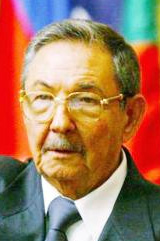HAVANA, (Reuters) – Cuba’s ruling Communist Party meets Saturday for a congress expected to introduce possible future leaders and endorse groundbreaking economic reforms in what is one of the world’s last one-party communist states.

The event, the most important since a Soviet-style system was formally adopted at the first party congress in 1975, could mark the beginning of the end of the long reign of leaders who have guided Cuba since the 1959 revolution and created the socialist model they now seek to preserve — through reform.
The 1,000 delegates in attendance will approve some or all of nearly 300 reforms proposed by President Raul Castro to end Cuba’s economic crisis by correcting past policy mistakes.
The changes, many already in place, include slashing the state workforce, subsidies and spending and a much greater opening to private enterprise, such as the right of small businesses to hire their own workers.
The reforms aim to boost the island’s state-dominated, debt-ridden and unproductive economy Castro says has brought Cuban communism to the brink of the abyss.
Castro plans to reduce the size of the state and expand the private sector while maintaining central planning and control. State subsidies to Cubans will be greatly reduced.
Most experts believe Cuba will have to make more dramatic changes to solve its economic problems, but the reforms “represent a clear and much-needed departure from previous ways of managing Cuba’s economy,” said Paolo Spadoni, political science professor at Augusta State University in Georgia.
“There is a chance to make more money and live a little better,” said Abel, a state construction worker thinking of starting up privately on his own. “But it all depends on whether they give us enough space. Cubans need more space.”
Present in the plan of Cuba’s leadership is the idea that communism, abandoned in most other countries where it was tried, can still be made to work in Cuba if executed properly.
The reforms resemble early steps toward change that China and Vietnam took in their economic liberalization paths, but Cuban leaders insist they are copying no one. A familiar government refrain is that Cuba is “unique.”
NEW LEADERS
TO APPEAR?
Part of Cuba’s uniqueness is that it has had basically the same leadership for more than five decades, but this congress might bring the first whispers of transition.
Raul Castro, who turns 80 in June, is expected to be elected First Secretary by the congress in place of his older brother Fidel Castro, 84. Raul officially succeeded Fidel as Cuban president in 2008 and has replaced him unofficially as head of the party.
Fidel, Cuba’s ruler for nearly half a century, wrote recently he had stepped down as head of the country’s only legal political party when he fell ill in July 2006.
But the selection of a Second Secretary and the party’s central committee will be watched closely because among them could be Cuba’s future leader.
“Keep your eye on the new crowd … if there is one,” said Christopher Sabatini, senior director of policy at the Americas Society in New York.
“Generally speaking, governments and political leadership throughout the region, not just Cuba, have proven themselves almost genetically incapable of renovating themselves from within,” he said.
Raul Castro has acknowledged that time is running out for him and for the cadre of stalwarts who fought with the Castros as guerrillas and are top officials in the government.
This congress, he said in a December speech to the Cuban parliament, “should be, as a fact of life, the last to be attended by most of us who belong to the revolution’s historical generation. The time we have left is short.”
